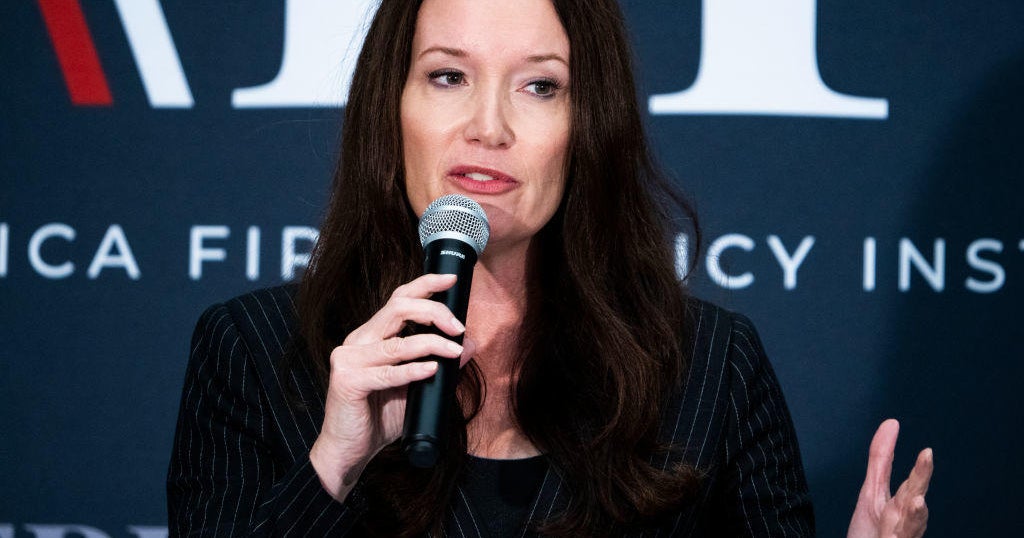CBS News
Senator calls on FAA to reject Boeing’s request for safety waiver for the 737 Max 7

In a letter obtained exclusively by CBS News, Democratic Sen. Tammy Duckworth of Illinois, chair of the Senate Subcommittee on Aviation Safety, demanded that the Federal Aviation Administration reject Boeing’s request for a safety waiver on the so far uncertified 737 Max 7, the smallest of the four 737 Max variants.
“Boeing forfeited the benefit of the doubt long ago when it comes to trusting its promises about the safety of 737 MAX, and the FAA must reject its brazen request to cut corners in rushing yet another 737 MAX variant into service,” she wrote in the letter sent late Wednesday to FAA Administrator Michael Whitaker.
The letter was penned on the same day that Boeing CEO Dave Calhoun traveled to Washington, D.C., to meet with legislators in the wake of an incident earlier this month in which the door panel of a 737 Max 9 blew off during an Alaska Airlines flight.
The FAA has grounded all 171 Boeing 737 Max 9s since the event, but announced Wednesday that it had cleared the way for the aircraft to return to service following a rigorous inspection and maintenance process.
Alaska Airlines said it expected to begin bringing its 737 Max 9s back into service on Friday, while United Airlines said its fleet would begin returning to service Saturday.
The issue in Duckworth’s letter centers around an anti-ice system on 737 Max engines that Boeing identified and self-reported to the FAA last year. The regulator approved Boeing’s guidance to mitigate the problem on the existing fleet of Max aircraft while Boeing engineered a fix by May of 2026.
The FAA issued an Airworthiness Directive in August 2023 Airworthiness Directive that it said “was prompted by a report indicating that use of engine anti-ice (EAI) in dry air for more than five minutes during certain environmental and operational conditions can cause overheating of the engine inlet inner barrel beyond the material design limit, resulting in failure of the engine inlet inner barrel and severe engine inlet cowl damage.”
The FAA told airlines that pilots should limit the use of the anti-ice system to less than five minutes until Boeing’s fix was available.
While the issue has never occurred in-flight, Boeing determined it was theoretically possible under specific weather conditions, and in a worst-case scenario, to result in components breaking off.
An uncontained engine failure on a previous generation Boeing 737 resulted in debris puncturing the cabin of Southwest Airlines flight 1380 in April 2018, resulting in a passenger being partially sucked out of the plane and killed.
The company is seeking a limited-time exemption that would also apply to the 737 Max 7 as it goes through the certification process. The exemption would also allow Boeing to deliver the Max 7 to airlines once certified. Boeing has more than 4,300 orders for the 737 Max family of aircraft. The issue also exists on 737 Max 8 and Max 9 aircraft already flying.
It is a waiver Senator Duckworth says Boeing should be denied.
“it is such a bold face attempt to put profits over the safety of the flying public,” Senator Duckworth said in an interview with CBS News. “They want a special permission to be allowed to continue to use this component with a known problem on an aircraft that has yet to be certified and allow it to be put into service. You cannot have a new baseline where we’re going to certify aircraft that are not safe to fly.”
Boeing declined comment on the letter. CBS News has also reached out to the FAA for comment.
CBS News
Trump picks former White House aide Brooke Rollins to lead the USDA

President-elect Donald Trump said Saturday that he will nominate former White House aide Brooke Rollins to be his agriculture secretary, the last of his picks to lead executive agencies and another choice from within his established circle of advisers and allies.
The nomination must be confirmed by the Senate, which will be controlled by Republicans when Trump takes office Jan. 20, 2025. Rollins would succeed Tom Vilsack, President Biden’s agriculture secretary who oversees the sprawling agency that controls policies, regulations and aid programs related to farming, forestry, ranching, food quality and nutrition.
Rollins, who graduated from Texas A&M University with a degree in agricultural development, is a longtime Trump associate who served as his former domestic policy chief. She is president and CEO of the America First Policy Institute, a group helping to lay the groundwork for a second Trump administration.
Tom Williams/CQ-Roll Call, Inc via Getty Images
Rollins, 52, previously served as an aide to former Texas Gov. Rick Perry and ran a think tank, the Texas Public Policy Foundation.
Rollins’ pick completes Trump’s selection of the heads of executive branch departments, just two and a half weeks after the former president won the White House once again. Several other picks that are traditionally Cabinet-level remain, including U.S. Trade Representative and head of the Small Business Administration.
Trump didn’t offer many specifics about his agriculture policies during the campaign, but farmers could be affected if he carries out his pledge to impose widespread tariffs. During the first Trump administration, countries like China responded to Trump’s tariffs by imposing retaliatory tariffs on U.S. exports like the corn and soybeans routinely sold overseas. Trump countered by offering massive multibillion-dollar aid to farmers to help them weather the trade war.
President Abraham Lincoln founded the USDA in 1862, when about half of all Americans lived on farms. The USDA oversees multiple support programs for farmers; animal and plant health; and the safety of meat, poultry and eggs that anchor the nation’s food supply. Its federal nutrition programs provide food to low-income people, pregnant women and young children. And the agency sets standards for school meals.
Robert F. Kennedy Jr., Trump’s nominee to lead the Department of Health and Human Services, has vowed to strip ultraprocessed foods from school lunches and to stop allowing Supplemental Nutrition Assistance Program beneficiaries from using food stamps to buy soda, candy or other so-called junk foods. But it would be the USDA, not HHS, that would be responsible for enacting those changes.
In addition, HHS and USDA will work together to finalize the 2025-2030 edition of the Dietary Guidelines for Americans. They are due late next year, with guidance for healthy diets and standards for federal nutrition programs.
CBS News
North Dakota Badlands national monument proposed with tribes’ support

A coalition of conservation groups and Native American tribal citizens on Friday called on President Joe Biden to designate nearly 140,000 acres of rugged, scenic Badlands as North Dakota’s first national monument, a proposal several tribal nations say would preserve the area’s indigenous and cultural heritage.
The proposed Maah Daah Hey National Monument would encompass 11 noncontiguous, newly designated units totaling 139,729 acres in the Little Missouri National Grassland. The proposed units would hug the popular recreation trail of the same name and neighbor Theodore Roosevelt National Park, named for the 26th president who ranched and roamed in the Badlands as a young man in the 1880s.
“When you tell the story of landscape, you have to tell the story of people,” said Michael Barthelemy, an enrolled member of the Mandan, Hidatsa and Arikara Nation and director of Native American studies at Nueta Hidatsa Sahnish College. “You have to tell the story of the people that first inhabited those places and the symbiotic relationship between the people and the landscape, how the people worked to shape the land and how the land worked to shape the people.”
The U.S. Forest Service would manage the proposed monument. The National Park Service oversees many national monuments, which are similar to national parks and usually designated by the president to protect the landscape’s features.
Supporters have traveled twice to Washington to meet with White House, Interior Department, Forest Service and Department of Agriculture officials. But the effort faces an uphill battle with less than two months remaining in Biden’s term and potential headwinds in President-elect Trump’s incoming administration.
If unsuccessful, the group would turn to the Trump administration “because we believe this is a good idea regardless of who’s president,” Dakota Resource Council Executive Director Scott Skokos said.
Dozens if not hundreds of oil and natural gas wells dot the landscape where the proposed monument would span, according to the supporters’ map. But the proposed units have no oil and gas leases, private inholdings or surface occupancy, and no grazing leases would be removed, said North Dakota Wildlife Federation Executive Director John Bradley.
The proposal is supported by the MHA Nation, the Spirit Lake Tribe and the Standing Rock Sioux Tribe through council resolutions.
If created, the monument would help tribal citizens stay connected to their identity, said Democratic state Rep. Lisa Finley-DeVille, an MHA Nation enrolled member.
North Dakota Gov. Doug Burgum is Trump’s pick to lead the Interior Department, which oversees the National Park Service. In a written statement, Burgum said: “North Dakota is proof that we can protect our precious parks, cultural heritage and natural resources AND responsibly develop our vast energy resources.”
North Dakota Sen. John Hoeven’s office said Friday was the first they had heard of the proposal, “but any effort that would make it harder for ranchers to operate and that could restrict multiple use, including energy development, is going to raise concerns with Senator Hoeven.”
CBS News
New Mexico city reaches $20 million settlement in death of woman fatally shot by officer

A city in New Mexico has reached a $20 million settlement with the family of a woman who was shot and killed by a police officer now charged with second-degree murder.
Teresa Gomez, 45, was fatally shot in October 2023 shortly after a Las Cruces police officer on a bicycle approached her while she sat in a parked car with another person, authorities said. Body camera video shows the officer shot Gomez three times as she tried to drive away.
The officer, identified by the city as Felipe Hernandez, was charged in January and fired months later from the Las Cruces Police Department.
“This settlement should be understood as a statement of the City’s profound feeling of loss for the death of Gomez and of the City’s condolences to her family,” the city of Las Cruces said in a news release sent Friday.
Hernandez has pleaded not guilty to the murder charge. His trial is scheduled for June 2. The Associated Press sent an email Saturday seeking comment from Hernandez’s attorney.
A lawyer for the Gomez family said her relatives are grateful to the city “for recognizing the injustice of Teresa’s death,” the Las Cruces Sun-News reported.
“They trust that the city will redouble efforts to make sure no other family suffers the tragedy of losing a loved one to abusive police conduct,” Shannon Kennedy said in a statement to the newspaper.











